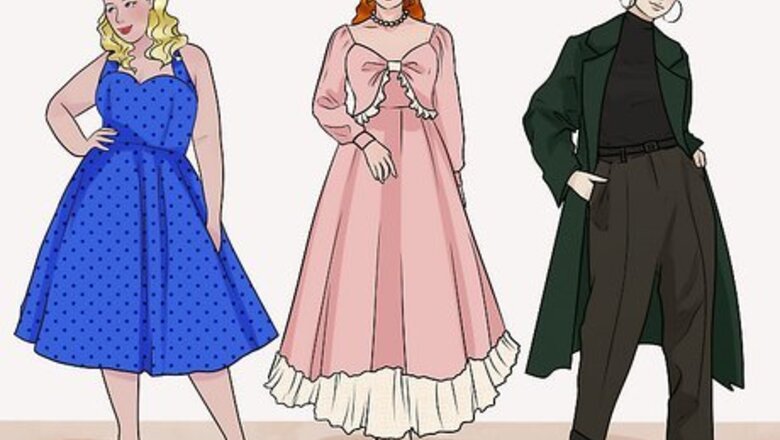
views
Selecting Vintage Pieces
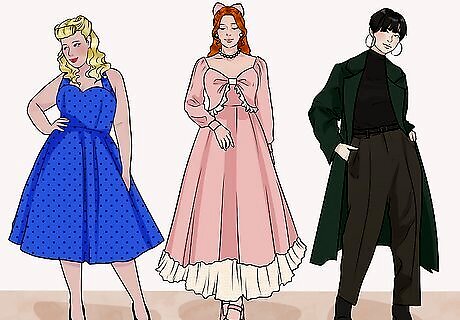
Choose pieces that reflect your personal style. Before selecting vintage pieces to add to your wardrobe, think about the style elements that you look for in clothing and accessories. While dressing in vintage clothing lets you expand your fashion horizons and experiment with different styles, you still want to look and feel like you. If you don’t feel comfortable and confident in your vintage finds, likely, you won’t end up wearing them. Working out your fashion style will help you select vintage pieces that you can easily incorporate into your wardrobe. When shopping for vintage, consider what you already own and how well each vintage piece will fit into your current wardrobe. Try looking at different styles on Pinterest and fashion blogs to help you identify what style elements match your aesthetic. This can give you ideas about what to look for when you are shopping for vintage pieces.
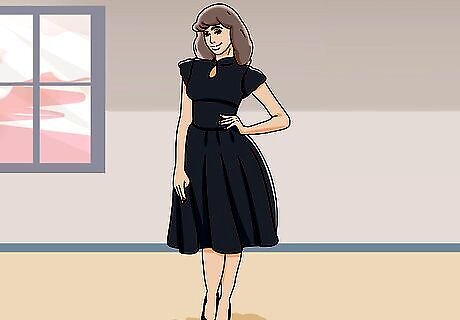
Look for vintage pieces in classic styles. If you want to avoid looking like you are wearing a costume, select vintage pieces in classic cuts that never go out of style. These pieces come in timeless shapes and colors that you can seamlessly incorporate into your wardrobe for years to come. For example, while fashion trends come and go, a classic vintage black shift dress, a statement-making vintage leopard swing coat, or a silk floral or neutral-shade tie-neck blouse will always be in style. Vintage t-shirts, denim or leather jackets, and hats are classics that you can incorporate into your wardrobe.
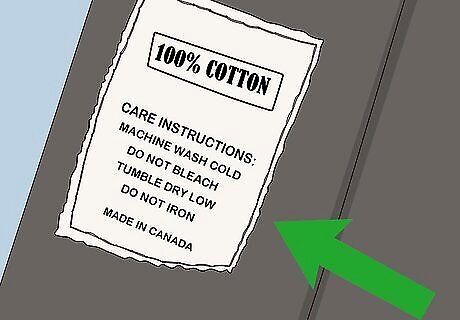
Focus on finding vintage items made of high-quality materials. When selecting vintage pieces, first check the tag to see what materials were used to make the item. Higher quality materials, such as cotton, silk, and wool, can withstand several cleanings and hold up well over time. While synthetic materials are fine for a statement-making piece or for special occasions, avoid synthetic materials if you plan on incorporating your vintage finds into your daily wardrobe. If you find a vintage piece that no longer has a tag, there are a few tricks you can use to assess the quality. The easiest way is to feel the fabric by rubbing it gently between your pointer finger and thumb. If the material feels sturdy yet soft to the touch, it is likely of higher quality. You can also compare the material with items that do have a tag to determine if they are the same material. Check carefully for stains, tears, or missing parts, as these can indicate that an item is of lower quality.
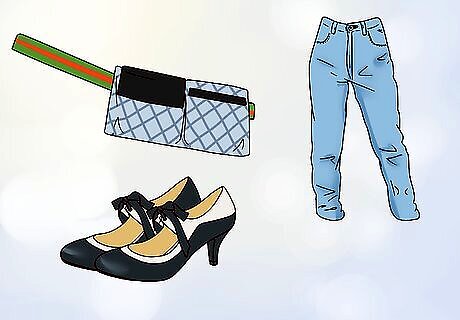
Look for trendy vintage items. Read fashion magazines, look at fashion bloggers’ sites, and/or peruse your favorite online retailers’ inventories to assess what styles are trending. When selecting vintage pieces, look for items with the same or similar characteristics. Most contemporary pieces are inspired by styles from the past, so what better way to show your fashion savviness than with a trendy item that is vintage and, therefore, totally unique.
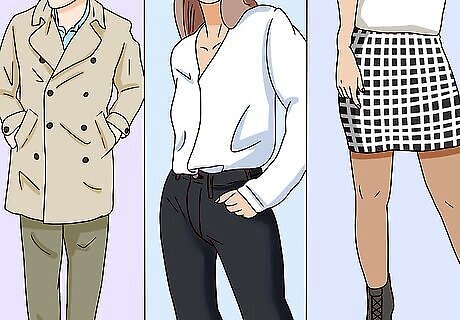
Learn the basics of vintage styles. Each decade has particular styles that are characteristic of that era. Learning to identify some of the styles attributed to the various eras of vintage can make it easier to select items that will generally look good together. While some experimentation is necessary (and fun!), learning the basics of vintage styles can give you some general rules of thumb to follow so that you can create vintage looks that are both unique and cohesive. The 1910s, for example, brought about the trench coat and lace-up boots. This era generally mixes well with the wide brimmed hats of the 1930s or rocker tees from the 1990s. To prevent clashing, however, avoid mixing 1910s vintage pieces with a 1920s beaded flapper dress or a 1980s neon tunic. Some decades, such as the 1940s and 50s, produced many now-classic styles in neutral tones. These styles, including 1940s cigarette pants and 1950s leather jackets, tend to mix well with each other, as well as many styles from various other eras. A 1950s leather jacket, for example, can look great with 1960s bell bottom jeans or a 1970s flowy, floral dress.
Building a Vintage Outfit
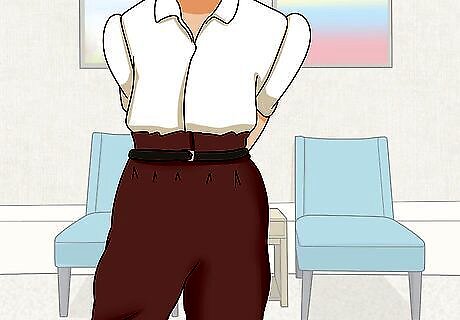
Combine vintage and new separates. Perhaps the easiest way to wear vintage and still look current is to mix one or two vintage pieces with contemporary styles. Add one classic vintage piece to an otherwise trendy and contemporary outfit for an added level of timeless sophistication, or try one standout vintage find with contemporary basics to let your vintage piece really shine. For a work-appropriate look, wear a vintage jacket or coat, such as a 1910s camel trench or a 1950s leather jacket, over a simple modern sheath dress. To show off unique, statement-making vintage pieces without overdoing, try styling 1960s bell-bottom jeans with a simple, neutral v-neck sweater, or a 1980s neon jacket over a clean white tank and your favorite denim.
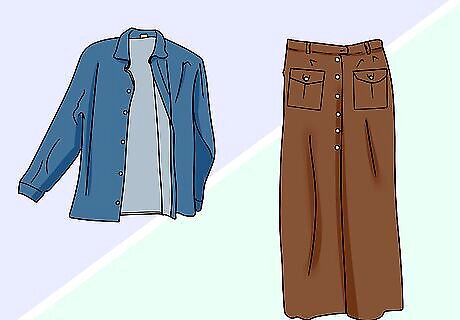
Mix different eras of vintage. While mixing different eras of vintage can be tricky and may take some trial and error depending on your specific pieces, the result can be an interesting look that will definitely be worthwhile. When trying out different mix and match vintage looks, try not to dwell on perfection. Sometimes conflicting styles come together to make the most unique and stylish outfits! For example, mix a 1990s rocker tee with a mid-20th century high-waist skirt for a perfectly imperfect, mismatched style. If you are feeling adventurous, try a printed skirt, such as a floral or leopard print. For an easier look, complement a 1980s silk blouse with 19th or early 20th century statement jewelry, such as an ornate collar necklace or chandelier earrings. Try styling a basic piece from one era with a statement piece from another, such as a 1960s little black dress with a 1980s sequined cardigan.
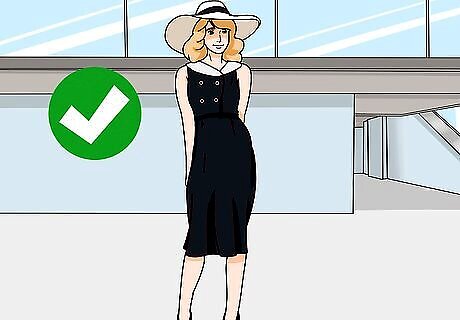
Go bold with a head-to-toe vintage look. Dressing in vintage is all about experimentation, so don’t be afraid to break the rules and have fun with your look. You can fully embrace dressing vintage with a quintessential, era-specific outfit, or choose more neutral items that are less obviously vintage. To make a statement in head-to-toe vintage, try a full-on 1960s outfit, such as a belted garden dress with a metal-frame handbag in a pastel hue. Complete the outfit with an era-appropriate wavy hairstyle. If you want to rock head-to-toe vintage without looking like you are wearing a costume, try a more timeless, simple outfit, such as a 1940s utility dress with low-heeled pumps.
Accessorizing Your Vintage Finds
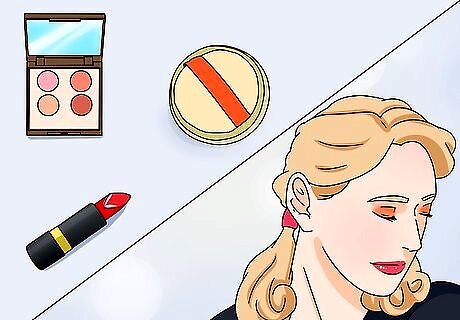
Use contemporary hair and makeup styles with your vintage outfit. To avoid looking like you walked off a period movie set, freshen up your vintage style with contemporary hair and makeup styling. While rocking a blunt bob with a flapper dress is a great look for a 1920s party, such hairstyling can instantly make your outfit look dated. Instead, try a sleek, modern style, such as a low ponytail, with neutral makeup to let your vintage outfit take center stage. In many cases, modern hair and makeup styles are inspired by vintage looks, so it can be difficult to decide how to update your vintage outfit. When in doubt, test it out! You can always switch up your hair and makeup before leaving the house. While modern makeup and hair styling trends can instantly freshen up your vintage outfit, classic styling is always a safe bet. For example, a classic nude lipstick is timelessly chic and goes well with any vintage look.
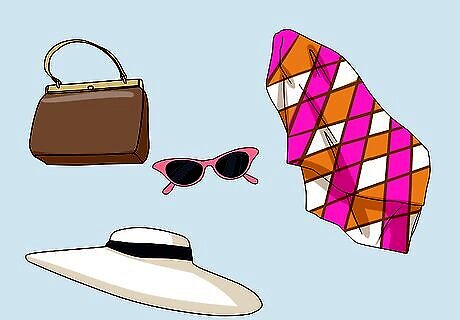
Wear contemporary accessories with vintage clothing. To instantly and easily update your vintage outfit, accessorize with modern shoes, jewelry, and/or handbags. Even if your clothing is noticeably vintage, complementing your outfit with contemporary accessories will instantly help modernize your look. If your vintage pieces make a big statement, try adding more neutral accessories, such as a simple nude pump shoe or chic gold hoop earrings.

Style vintage accessories with a contemporary look. To add a touch of vintage to an otherwise modern outfit, complete your ensemble with one or two vintage accessories. Vintage scarves, handbags, and jewelry can be found at a number of resale retailers for relatively little money, so there are a lot of options to choose from. For example, you can instantly elevate an otherwise mundane modern outfit by adding a 1930s beaded clutch or a 1980s statement necklace. To add a level of sophistication, try accessorizing your modern outfit with a 1970s minimalist cape or a classic houndstooth print scarf.


















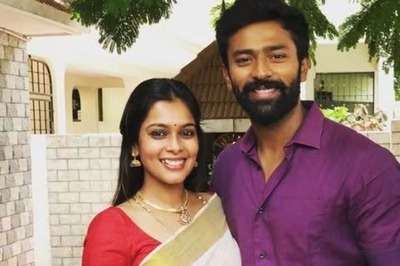

Comments
0 comment